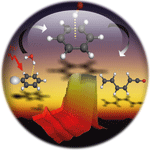research Topics
 The focus of our research is in the field of physical organic chemistry. The ambitious goals of physical organic chemistry are to predict structures and properties of reactants, transition states, and products of any reaction and thus to predict the course of chemical reactions. Thus, the reactive intermediates which are passed on the way from reactants to products are of key importance. Reactive intermediates in that sense are not only the classical intermediates such as radicals, carbenes, carbocations, etc., but also unstable conformations of a molecule and weakly bound intermolecular complexes.
The focus of our research is in the field of physical organic chemistry. The ambitious goals of physical organic chemistry are to predict structures and properties of reactants, transition states, and products of any reaction and thus to predict the course of chemical reactions. Thus, the reactive intermediates which are passed on the way from reactants to products are of key importance. Reactive intermediates in that sense are not only the classical intermediates such as radicals, carbenes, carbocations, etc., but also unstable conformations of a molecule and weakly bound intermolecular complexes.
In our group reactive intermediates are not only indirectly identified by trapping experiments – which is a source of many erroneous mechanistic interpretations in literature – but predominantely characterized by direct spectroscopic methods. The major tools used to achieve this are matrix isolation spectroscopy and laser flash photolysis (LFP). Both techniques are complementary and together allow us to gain detailed information on the structure and properties of reactive intermediates. The spectroscopic data obtained with these methods are interpreted by comparison with results of quantum chemical calculations. Reliable computation data are also necessary to evaluate spectroscopic methods. A major difference between our laboratory and laboratories of physical chemistry is that we also use synthesis as a tool for exploring chemical reactions. Thus, all precursors and reference compounds are synthesized in our laboratory. This also includes the synthesis of specifically isotopic labelled compounds.

